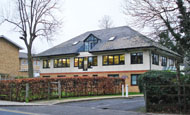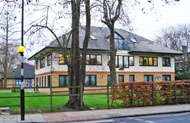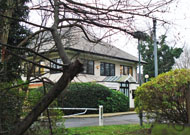Bearsted Memorial Hospital
85 Lordship Road, Tottenham, N16 5HE
Medical dates:
Medical character:
1947 - 1974
Maternity
In 1937 plans began to build a new hospital to replace the small cramped Jewish Maternity Hospital
in Whitechapel. A site in Stoke Newington was favoured as by this
time a large number of the Jewish younger generation had moved away
from the East End to north London. Considerable amounts of money
had been raised for the project from pennies subscribed by poor Jews in
the East End as well as from many wealthy donors, including Viscount Bearsted, after whose family the Hospital was named.
Building work began in 1939 but almost immediately had to be
deferred because of the outbreak of WW2. Additional premises were
acquired at Hampton Court; this annex became known as the Bearsted Maternity Hospital.
In 1945 permission was granted for part of the new Hospital to be built
in Lordship Road. This first section was finally completed in
August 1947 and officially opened in December by Viscountess
Bearsted, the president of the Hospital. It had 30 beds,
including 6 private patient rooms, plus 28 beds at its Hampton Court
branch over 20 miles away. Until the rest of the building could
be completed, the Hospital made arrangements with the Prince of Wales General Hospital
to use their X-ray, pathological and dental services. In fact, in
time, the medical staff in obstetrics, gynaecology and paediatrics
served both Hospitals.
The Hospital joined the NHS in 1948 and, while still mainly catering
for orthodox Jewish mothers (some 80%), also admitted women of other
faiths.
By 1954 the building had still not been completed, although the
Minister of Health had promised in 1952 it would be. Labour wards
and operating theatres had been installed for a hospital that would
eventually have 100 beds, as well as kitchens and heating and steam
facilities.
By 1969 the Royal College of Obstetricians had withdrawn recognition of
the Hospital for postgraduate medical training because of the lack of
sufficient beds, and this lack of beds also threatened withdrawal
of the midwifery training school by the Central Midwives Board, who
believed that a minimum of 50 beds was necessary for satisfactory
training. The Hospital sought permission to add another storey so
that there would be 68 beds, but this was denied.
By 1971 the decreasing Jewish population of the area and subsequent
reduction in the number of Jewish mothers admitted to the Hospital
affected the training of mohelim, who performed ritual circumcisions
there (17 were performed in 1971, compared to 33 in 1970 and 37 in
1969).
In November 1974 the Enfield and Haringey Area Health Authority ordered
the Hospital to be closed, ostensibly because of staff shortages.
However, the real reason for the closure seemed to be that
there was a large surplus of maternity beds in the district when the
new maternity wing at the North Middlesex Hospital opened.
(Government policy at this time, following a major NHS
reorganisation, was that maternity units should be placed in a district
general hospital rather than be stand-alone units.)
Protest over the closure of the unique Jewish maternity hospital was
made by the Board of Deputies of British Jews, the Chief Rabbi and the
Jewish Chronicle, as well as a petition signed by over 2000 people, but
this made no difference.
The Department of Health and Social Security
handed the Bearsted Memorial Hospital back to the Jewish community for
'social service purposes'.
|
Present status (January 2008) |
|---|


The Bearsted Centre, as seen from across Lordship Road

The entrance to the side of Wellbeing at Bearsted, opened by Cherie Blair in 2008.
| Interestingly, in 1947, the cost of an in-patient per week at Lordship Road was £23.00, whereas it was £12 13s 10d (£12.69) at Hampton Court. |
References
http://hansard.millbanksystems.com (1954)
http://hansard.millbanksystems.com (1974)
www.british-history.ac.uk
www.movinghere.org.uk